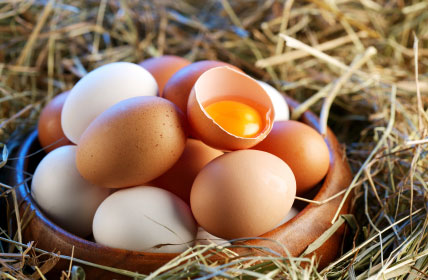
Written By: Beth Ehrensberger, RD
Title: Registered Dietitian
Alumni: University of Tennessee, Knoxville
Last Updated on:

If you or a loved one are avoiding eggs because of an egg allergy, it can be frightening to think of the consequences of accidental ingestion. Nutritionally speaking, if you’re omitting eggs, it’s important to think about how you’ll squeeze the vitamins and minerals that you’re missing back into your diet. Plus, it’s frustrating: after all, it’s just not as easy as skipping the eggs at breakfast – eggs can hide in many other foods. Read on for some simple ideas of how to identify and replace eggs nutritiously!

Table of Contents
Eggs can stealthily stow away in foods like baked goods, pasta, salad dressings (mayonnaise is made with egg), drinks, pretzels, and some bagels (which have an egg wash). What’s more, powdered egg yolks and whites are often used to boost protein in foods like sandwich pockets, veggie burgers, and frozen meals, so it’s essential to read the food label carefully if you have an egg allergy.
Now that you know where to find eggs, the next question you’ll undoubtedly have will be how to replace them in your favorite recipes. Unfortunately, even with the craftiest swapping, there’s no way to replicate eggs “any style” or omelets. As for other foods that contain eggs, it’s easier than you think to make a sound substitution. Here’s how to do it for two of the most common needs – baking and mayonnaise use:
It’s not possible to completely match the nutrient profile of eggs, but you can choose foods that add some of the vitamins, minerals, and nutrients that eggs provide. One large egg has about 70 calories and is a standout for its protein (6 g) and its punch of 13 essential nutrients, including choline, lutein, folate, Vitamin D, and riboflavin. To add the power of lutein and folate to your diet, do as Popeye insists, and sneak in a serving or two of spinach. And if you’re watching your weight, be sure to pack your breakfast with protein to replace those missing eggs. A 2008 St. Louis University study found that people following a low-fat, low-calorie diet – but who ate an egg breakfast – enjoyed a 65 percent greater weight loss than people who followed the same type of diet but ate a bagel breakfast instead. Eggs may not possible for your breakfast, but it’s the filling protein that makes the difference. Try a whole-grain English muffin with a slice of Canadian bacon accompanied by a small low-fat latte. Or, if you’re going vegetarian, smear a couple of tablespoons of almond or peanut butter on the English muffin instead.
Just because you have an egg allergy, that does not mean you have to miss out on healthy and delicious foods. There are plenty of worthy substitutions to make your egg-free diet full of flavor and nutrition!
Alumni: University of Tennessee, Knoxville – Beth Sumrell Ehrensberger is a Registered Dietitian and holds a Master Degree in Public Health. An experienced nutrition counselor, writer and public speaker, Beth specializes in translating complex nutrition information into practical concepts. Beth was awarded a Nutrition Communications Fellowship to the National Cancer Institute, and has worked on the internationally recognized Nutrition Action Healthletter of the Center for Science in the Public Interest.